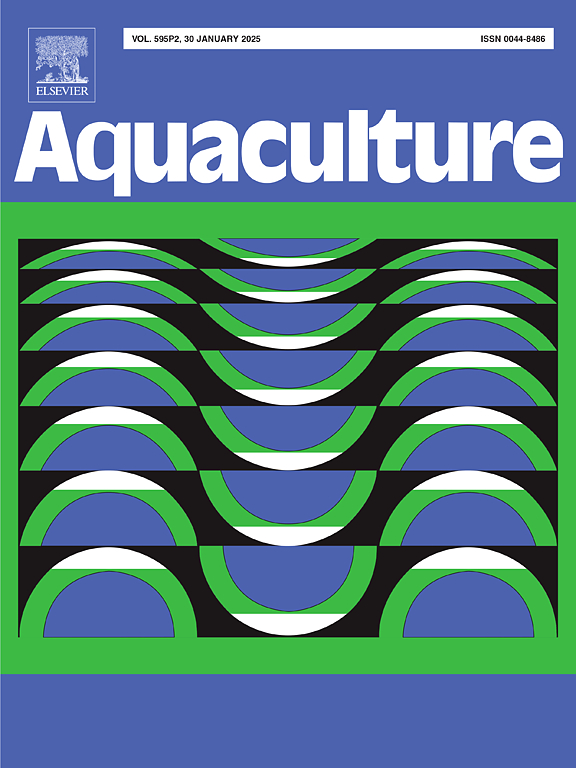Life cycle assessment of Tilapia production via conventional aquaculture and aquaponic systems
IF 3.9
1区 农林科学
Q1 FISHERIES
引用次数: 0
Abstract
The rapid growth of aquaculture towards global food security presents environmental challenges necessitating the adoption of sustainable practices and technologies. Aquaponics is potentially one of the Nature-based Solutions (NbS), relying on the symbiosis between fish, bacteria, and plants to create a sustainable system that enhances food and water security while purportedly reducing environmental impacts. The study assesses and compares the environmental performance of aquaponics producing tilapia and lettuce with corresponding conventional production using life cycle assessment (LCA). The results revealed that aquaponics tilapia generally performs worse than conventional production in all environmental impact categories, except for eutrophication, terrestrial ecotoxicity, and water consumption. Partially replacing fish meal with plant-based protein (e.g., soybean meal) in tilapia feed can generally reduce the environmental impact of tilapia production in both conventional systems and aquaponics. Using solar energy can improve the environmental performance of tilapia production in aquaponics. Replacing fishmeal with soybean meal in fish feed and using solar energy in fish farming can make the performance of aquaponics tilapia better than conventional production in most categories, except for terrestrial ecotoxicity and human toxicity. From the perspective of lettuce production, even after improvements, aquaponics lettuce still performs worse than conventional production across all impact categories, except for terrestrial acidification and marine eutrophication. This highlights that NbS, such as aquaponics, may not always guarantee better outcomes than conventional production systems. The trade-off between environmental benefits in certain areas and the higher energy demands highlights the challenge of adopting aquaponics as a sustainable alternative to conventional farming.
通过传统水产养殖和水培系统生产罗非鱼的生命周期评估
水产养殖对全球粮食安全的快速增长带来了环境挑战,需要采用可持续的做法和技术。鱼菜共生是一种潜在的基于自然的解决方案(NbS),依靠鱼、细菌和植物之间的共生关系来创造一个可持续的系统,增强食物和水的安全,同时据称减少了对环境的影响。本研究采用生命周期评价法(LCA)对鱼菜共生养殖罗非鱼和生菜与传统养殖的环境绩效进行了评价和比较。结果表明,除富营养化、陆地生态毒性和耗水量外,鱼菜共生罗非鱼在所有环境影响类别中的表现普遍差于常规养殖。用植物蛋白(如豆粕)部分替代罗非鱼饲料中的鱼粉,通常可以减少传统系统和鱼菜共生系统中罗非鱼生产对环境的影响。利用太阳能可以改善鱼养罗非鱼养殖的环境效益。鱼饲料中以豆粕代替鱼粉和养鱼中使用太阳能,除陆地生态毒性和人体毒性外,鱼菜共生罗非鱼在大多数类别的性能都优于常规养殖。从生菜生产的角度来看,即使经过改进,除陆地酸化和海洋富营养化外,水培生菜在所有影响类别中的表现仍然不如传统生产。这突出表明,水产共生等国家统计局可能并不总能保证比传统生产系统取得更好的结果。某些地区的环境效益与更高的能源需求之间的权衡突出了采用鱼菜共生作为传统农业的可持续替代方案的挑战。
本文章由计算机程序翻译,如有差异,请以英文原文为准。
求助全文
约1分钟内获得全文
求助全文
来源期刊

Aquaculture
农林科学-海洋与淡水生物学
CiteScore
8.60
自引率
17.80%
发文量
1246
审稿时长
56 days
期刊介绍:
Aquaculture is an international journal for the exploration, improvement and management of all freshwater and marine food resources. It publishes novel and innovative research of world-wide interest on farming of aquatic organisms, which includes finfish, mollusks, crustaceans and aquatic plants for human consumption. Research on ornamentals is not a focus of the Journal. Aquaculture only publishes papers with a clear relevance to improving aquaculture practices or a potential application.
 求助内容:
求助内容: 应助结果提醒方式:
应助结果提醒方式:


